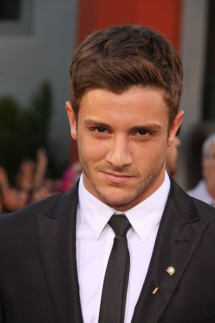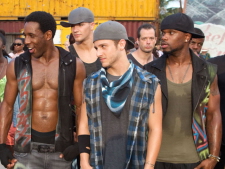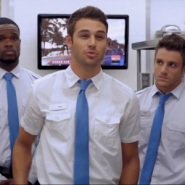 This weekend sees the release of Step Up Revolution, the fourth film in this surprisingly successful franchise. But Revolution isn’t simply a retread of the three previous films. This latest entry leaves the world of dance battles behind to explore the phenomenon of flash mobs. CHUD had the chance to catch up with dancer/actor Misha Gabriel, who plays Eddy in the film – mastermind of a guerilla flash crew none only as “The Mob.” We discuss not only the film, but his experiences as a successful dancer in the entertainment business:
This weekend sees the release of Step Up Revolution, the fourth film in this surprisingly successful franchise. But Revolution isn’t simply a retread of the three previous films. This latest entry leaves the world of dance battles behind to explore the phenomenon of flash mobs. CHUD had the chance to catch up with dancer/actor Misha Gabriel, who plays Eddy in the film – mastermind of a guerilla flash crew none only as “The Mob.” We discuss not only the film, but his experiences as a successful dancer in the entertainment business:
Tim Kelly: You’ve been dancing for a long time, working alongside artists like Mariah Carrey, Beyonce, Christina Aguilera, Ne-Yo, Janet Jackson. With a role like Eddy, you have the opportunity to apply that experience in an acting setting.
I’m curious, for someone who’s been dancing since they were two, what’s the bigger challenge now? Dancing or acting?
Misha Gabriel: At the moment it’s acting. It’s definitely the new adventure for me. And I think I’ve been dancing long enough so it’s sort of second nature. But I welcome the challenge and I’ve sort of gotten the bug, I think.
TK: So it’s something you’ll want to pursue now to a greater extent.
MG: Without a doubt, it’s 100% where I see myself headed.
TK: I read that you were involved with This Is It at Sony, which obviously became a difficult ordeal. What sort of lessons do you take away from an experience like that? Or even working alongside an artist like Michael Jackson?
MG: It’s a roller coaster, the whole experience. I try to take more good than bad from it, to be honest. As a child, that was literally my dream. For me to even be able to say that I shared the stage with him was a dream come true. So, although it didn’t happen, I still grasped a piece of it. And it was an extreme accomplishment for me.
 And being around Michael, his energy is just insane. Just being able to see his work ethic and how he handles his work, and how he sort of treats every aspect of his show whether it be the music, or the dancing or the lighting; it’s all connected. He’s very hands on. It made me realize that there is a way to make things perfect and that’s why he is who he is. That’s why the work comes out the way it does, because he cares that much.
And being around Michael, his energy is just insane. Just being able to see his work ethic and how he handles his work, and how he sort of treats every aspect of his show whether it be the music, or the dancing or the lighting; it’s all connected. He’s very hands on. It made me realize that there is a way to make things perfect and that’s why he is who he is. That’s why the work comes out the way it does, because he cares that much.
TK: And you can definitely see that influence in a movie like Step Up Revolution.
MG: Absolutely.
TK: So talking about the movie now, Revolution focuses on the phenomenon of flash mobs. There was even a flash mob at the screening I attended.
MG: Awesome, awesome!
TK: Yeah, what do you think it is about the phenomenon that’s catching on with so many people?
MG: It’s so funny, because coming from a dancing perspective flash mobs aren’t these elaborate dance pieces. They’re sort of simple, but I think what we’ve done in this movie is we’ve taken them to a whole new level. We sort of touch on the fact that they’re extremely popular these days and, like I said, just taken it to a higher level. So it’s flash mobs, but it’s amazing, mind-blowing flash mobs.
TK: Aside from the complex numbers in the film, have you ever been in a flash mob in real life?
MG: [Laughs] Nope, I can’t say I have! You usually gotta pay me to dance.
TK: With films like the Step Ups, the complexities of the dance numbers are of course the films’ biggest selling point. What are the difficulties inherent with pulling these scenes off? They look effortless in the movie but I imagine it’s not that way on set.
MG: No, definitely not. For example, we shot the very opening of the movie in August in grueling intense heat. It was a lot to shoot for this one opening scene. You can do the math, it was intense. It’s hot and it’s grueling and there’s a lot of elements involved. There’s dancing and rehearsing and jumping off a car. And then capturing it the right way.
Like you said, the final product seems [effortless]. But the work going into it is not.
TK: Step Up is atypical for a successful franchise: rotating casts, non-connected stories. Why do you think the film’s appeal to such a wide audience?
MG: Well, first the dancing. And, coming from my background, it’s nice to see that. I’d like to believe we’re just as athletic as any other people. It’s never been given that attention. It’s being pushed to the forefront and I think that’s amazing.
 What I think is unique about this film is that it gets away from the dance battles. We’ve seen those movies and we’re sort of over it. Every dancer has seen the dance battle movies. We stepped away from that premise and we have a unique storyline which allows you as a viewer to become more engaged. It’s a visually pleasing film to watch.
What I think is unique about this film is that it gets away from the dance battles. We’ve seen those movies and we’re sort of over it. Every dancer has seen the dance battle movies. We stepped away from that premise and we have a unique storyline which allows you as a viewer to become more engaged. It’s a visually pleasing film to watch.
TK: I write for a site that might not be considered Step Up‘s main audience, ie a lot of men. What would you say to convince them that this is a film that’s worth their time?
MG: Convince them to see the movie? It’s a good movie, A. And your girlfriends will want to see it! It’s the kind of movie where you’ll leave the theatre enjoying yourself. And you don’t have to be a teenybopper to enjoy dance. It’s for all audiences! It affects all genres, and this particular movie I’m extremely proud of.
~
A big thank you to Mr. Gabriel for taking the time to speak to us. Step Up Revolution arrives in theatres this weekend.